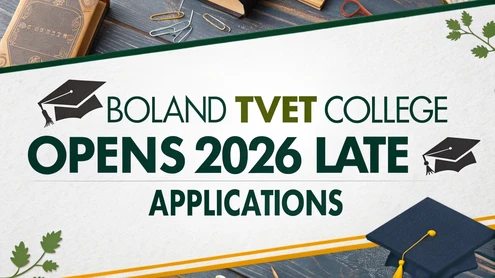Choosing what to do after high school can feel overwhelming. For years, the spotlight has mainly been on universities, painting them as the gold standard for success. But what if university isn’t the right fit for you? Whether it's due to academic performance, finances, or simply a different career goal, there's another valuable path that often gets overlooked — TVET colleges.
TVET stands for Technical and Vocational Education and Training, and these colleges offer practical, hands-on education designed to prepare students for specific trades and careers. In South Africa, the Department of Higher Education and Training oversees 50 public TVET colleges with campuses spread across the country. If you’re unsure about going the traditional university route, here’s why choosing a TVET college could be one of the smartest decisions you make.
1. TVET Colleges Focus on Employable Skills
Unlike university programs that tend to focus heavily on theory, TVET colleges are skills-based. Their goal is to equip students with practical knowledge that can be used immediately in the workplace.
Whether you're training to become a plumber, electrician, hairdresser, chef, IT technician, or office administrator, TVET colleges provide real-world skills that are in demand. In a country like South Africa where youth unemployment is high, learning a trade or skill that can lead directly to employment or entrepreneurship is a major advantage.
2. Courses Are Often Shorter and More Affordable
University degrees typically take three to four years to complete and can come with a hefty price tag. TVET courses, on the other hand, are often shorter and more cost-effective. Many programs can be completed in 12 to 24 months, and some even offer part-time options for those who are already working or have other responsibilities.
The National Student Financial Aid Scheme (NSFAS) also funds many TVET college programs for eligible students, covering tuition, accommodation, transport, and even study materials. This makes TVET education more accessible, especially for students from low-income households.
3. Greater Flexibility for Career Changes
One of the most underrated benefits of TVET colleges is their flexibility. Many people realize after finishing high school — or even after starting university — that they want to pursue a different path. TVET colleges offer short courses and modular training, which makes it easier for students to pivot without the long-term commitment and high costs of university.
Let’s say you’re interested in construction now, but later want to move into business or IT. With the National Certificate (Vocational) or NC(V) and NATED/Report 191 programs, you can build your qualifications step-by-step, even changing your focus along the way.
4. Pathways to University Still Exist
Choosing a TVET college doesn't mean you’re closing the door on university forever. In fact, many TVET programs provide articulation pathways into university-level qualifications. If you perform well in your diploma or national certificate program, you could qualify to pursue a degree at a university or university of technology.
This allows students to build a solid foundation in a specific field before committing to the more demanding and expensive university system. It's a strategic option, especially for students who may not have qualified for university straight out of high school.
5. Opportunities for Entrepreneurship
TVET education encourages self-employment just as much as formal employment. With practical skills in hand, many graduates go on to start their own businesses. Think of mechanics who open their own garages, electricians who contract with households, or chefs who launch catering businesses.
In a growing economy, we need more job creators, not just job seekers. TVET colleges prepare students to not only work for others but also to become their own bosses, which is vital for economic growth and reducing unemployment in South Africa.
6. Meeting Industry Demand
There’s a growing skills shortage in South Africa in areas like engineering, construction, IT, and health services. TVET colleges work closely with employers and industry bodies to design courses that align with what the job market needs. This industry-driven approach means that graduates are often job-ready and more likely to be hired.
The Department of Higher Education and Training’s “Decade of the Artisan” campaign is a great example of how government is promoting trades and artisan training. With the country needing more qualified artisans, choosing a TVET college can put you in a strong position to fill that gap.
7. Accessible Entry Requirements
University entrance often requires high academic achievement, especially in subjects like mathematics and physical sciences. Many students who don’t meet these strict entry requirements end up feeling like they have no options. But TVET colleges provide a second chance.
You can apply with a Grade 9, 10, 11 or 12 certificate, depending on the course. Some colleges also offer bridging or foundational programs to help students build up their qualifications. This inclusivity makes TVET colleges an excellent alternative for those who might not thrive in an academically intense environment.
8. Hands-On Learning Environment
TVET students often thrive because of the practical, hands-on training provided. You won’t just sit in a classroom taking notes; you’ll be actively working in workshops, using tools, machines, and software relevant to your future job.
This learning approach suits many students who are more kinesthetic learners — those who understand better by doing rather than just listening. It also means students leave with confidence in their abilities, having already performed many of the tasks their job will require.
9. Diverse Program Offerings
TVET colleges cover a wide range of sectors — from agriculture, hospitality, and tourism, to business management, information technology, and engineering. No matter where your interests lie, there’s likely a TVET course that matches your career goals.
This diversity of offerings makes TVET colleges a practical solution for students with broad interests or those still exploring their career options.
10. You Can Start Earning Sooner
With shorter course durations and job-ready skills, many TVET graduates enter the workforce sooner than their university counterparts. While university students are still in lecture halls, TVET students are often gaining work experience, building networks, and earning an income.
This early start can be life-changing, especially for young people supporting their families or trying to become financially independent.
Final Thoughts
University is a great option for many, but it’s not the only path to success. For countless young South Africans, TVET colleges offer a more affordable, practical, and direct route into the world of work or entrepreneurship.
If you’re not sure that university is right for you, don’t feel discouraged. The goal is to find a learning path that matches your interests, strengths, and life goals — and for many, TVET is exactly that.
So if you're ready to build a career, gain real-world skills, and take control of your future, consider applying to a TVET college. It might just be the smartest choice you make.


